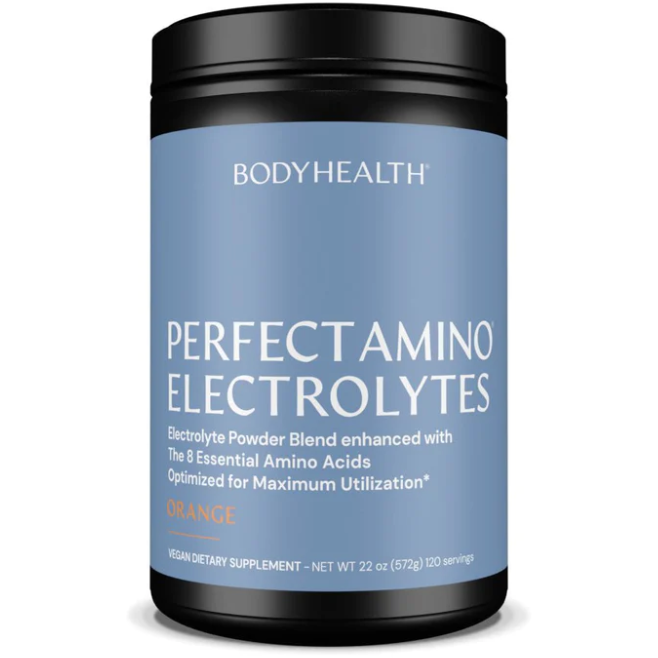Peak Performance Summer Workouts: Hydration & Electrolyte Replacement

Share
As we enter the long, hot summer days, many people will resume exercising outdoors. Exercising outdoors is an excellent way to maintain good health, but proper care must be taken to ensure it is done safely. This means understanding and maintaining proper electrolyte levels. This article will discuss the various electrolytes, their importance, and potential causes of electrolyte imbalances. We will also list the top electrolyte food sources and the best all-natural electrolyte supplements.
What Are Electrolytes?
Electrolytes are electrically charged minerals that help the organs, cells, and muscles work properly. They also help regulate the body's fluid balance, which is essential for exercising in the summer heat.
Electrolyte Types
There are 7 electrolytes, and each has many important functions in the body:
- Bicarbonate. Bicarbonate is a key component of balancing pH levels in the body and helps keep the blood pH stable. Many people are familiar with sodium bicarbonate, also known as baking soda.
- Sodium. Sodium is considered an essential electrolyte in extracellular fluid. It helps prevent muscle cramps, regulate fluids, and maintain a normal balance. Sodium also helps eliminate excess carbon dioxide from the body and facilitates glucose absorption.
- Magnesium. The body uses magnesium in various ways, including muscle functioning, ATP metabolism, neurological functions, and the release of neurotransmitters.
- Chloride. Chloride is found primarily in extracellular fluid and has many uses, including absorbing and transporting nutrients, maintaining blood pressure and fluid balance, contracting muscles, and transmitting nerve signals.
- Calcium. Nearly 99% of the body’s calcium is in the bones and teeth. It plays a key role in blood clotting, hormone secretion, muscle contractions, the transmission of nerve impulses, and skeletal mineralization. It is the most abundant mineral in the body and is needed to maintain strong bones.
- Phosphorus. Another extracellular fluid, 85% of the body’s total phosphorous is found in the bones and teeth. It regulates the normal functions of the heart and other muscles and helps the body turn fat, protein, and carbs into energy.
- Potassium. A few of potassium’s uses include removing cellular waste, regulating heartbeat, and proper blood pressure levels. Other functions include maintaining normal fluid levels inside and outside of cells and protecting the body against cardiovascular disease, poor bone health, and kidney ailments.
Electrolyte Imbalances
Electrolyte imbalances can occur if certain minerals in the blood get too high or too low. These imbalances can disrupt normal bodily functions, and severe ones could be life-threatening.
The most common signs of an electrolyte imbalance include the following:
- Fatigue
- Headaches
- Confusion or irritability
- Constipation or diarrhea
- Numbness or tingling in fingers and/or toes
- Irregular heartbeat
- Muscle cramps
- Nausea and vomiting
Studies on electrolyte imbalances show they are often associated with a variety of health issues, including cardiovascular problems, abnormal blood levels, and kidney issues.[1]
Note: symptoms of an electrolyte imbalance can vary, depending on the type of electrolyte in question and the severity of the imbalance. Consult with a physician immediately if you suspect an electrolyte imbalance.
Exercise and Electrolytes
Electrolytes and fluids are needed to sustain optimum fluid and hydration levels when exercising. A reduction in electrolytes could reduce aerobic output and strain the cardiovascular system. This is especially true when performing vigorous exercise in hot weather, where sweat production is increased.
Muscle cramps are a common sign of electrolyte imbalances in athletes, which signifies an excessive loss of sodium.[2] Sweat contains fluid and electrolytes, which must be replaced to maintain athletic output during and after the workout.
Best Foods for Electrolytes
Diet plays a key role in electrolyte levels. Care must be taken to consume a diet rich in electrolytes daily, especially during summer months when exercising outdoors. The foods we eat can either replenish electrolyte levels or deplete them. Here are the best foods for electrolyte levels:
|
Phosphate |
Potassium |
Calcium |
Magnesium |
|
Squash |
Spinach (cooked) |
Dark leafy greens |
Seeds |
|
Tuna |
Oranges |
Cheese |
Spinach (cooked) |
|
Lean chicken breast |
Cantaloupe |
Yogurt |
Beans |
|
Lentils |
Potatoes |
Milk (skim, almond, coconut) |
Nuts |
|
Pumpkin seeds |
Bananas |
Sardines (canned) |
Avocado |
|
Beef |
Avocado |
Tofu |
Dark chocolate |
|
Paprika |
Dried Coriander |
Cinnamon |
Ground turmeric |
Note: While sodium is an electrolyte vital to overall health, the average American consumes too much of this mineral. According to the FDA, Americans eat approximately 3400 mg of sodium daily, but the recommended amount is less than 2,300 mg daily. However, care should be taken to replace sodium lost during vigorous exercise in hot temperatures.
Surprising Causes of Electrolyte Depletion/Imbalance
In addition to sweat and strenuous exercise, the following could cause an electrolyte imbalance:
- Salty foods
- Foods high in glutamate, MSG, or monosodium
- Cardiovascular disease
- Diuretics. Diuretics increase urine flow and induce sodium loss. Common side effects could include weakness, dizziness, and electrolyte imbalance.[3]
- High levels of fructose, glucose, or corn syrup
- Nicotene
- Burns
- Stress. Studies indicate magnesium levels are “highly associated” with stress levels. Research is ongoing to discover the link between increased stress levels and the reduction of this important electrolyte.[4]
- Caffeine
- Digestive issues. Diarrhea, vomiting, and other gastrointestinal disorders can increase the risk of decreased phosphate, chloride, and magnesium levels[5]
- Certain medications, such as antibiotics, chemotherapy drugs, laxatives, asthma medications, birth control pills, and insulin, could impact electrolyte levels. Consult your physician for more information.
Top Electrolyte Supplements
Electrolyte supplements are an excellent way to replenish the minerals lost during exercise. Here are three of the best all-natural electrolyte supplements available.
PerfectAmino® Electrolytes
PerfectAmino® Electrolytes is an electrolyte drink formula specifically designed to help rebuild muscle and improve endurance. It also provides the body with the hydration it needs and the protein-building boost it requires to maintain high-quality workouts and recover faster.
Key ingredients inPerfectAmino® Electrolytes include the following: 
- Magnesium. Plays a key role in hundreds of cellular reactions in the body, including allowing your muscles to contract and make DNA.
- Trace minerals. Used by the body to help keep the bones, heart, brain, and muscles working properly
- Zinc. Assists in bolstering the immune system, heal wounds, make proteins and DNA
- Sodium. Helps with fluid and water regulation
- Potassium. Assists with the functioning of the nerves, skeletal and cardiac muscles
In addition to orange,PerfectAmino® Electrolytes also comes in a delicious Watermelon flavor.
Electrolyte Concentrate E-lyte
E-lyte provides optimal hydration in the body by mimicking electrolyte levels. It is packed with magnesium, potassium, and sodium, three critical ingredients needed to bring electrolytes back into perfect pH balance.E-lyte is ideal for the following: 
- Everyday athletes
- Pregnant women
- Help reduce painful cramps
- Staying energized throughout the day
In addition,E-lyte is all-natural, containing no sugars or artificial flavors, making it a perfect afternoon coffee replacement for a brain and body boost minus the energy spike and crash typically seen with caffeine. Simply mix 1 capful in 8 ounces of water to achieve its benefits.
Upgraded Potassium
Upgraded Potassium is unique because it provides a pure dose of potassium, helping to create stronger muscles and bones, boost the immune system, and reduce stress.
Upgraded Potassium provides other key benefits as well: 
- Balances electrolytes
- Regulates heart and blood pressure
- Increased muscle retraction and recovery
- Improves absorption of potassium, calcium, and other minerals
- Supports bone health
- Reduces adrenal fatigue
Summary
Electrolytes are essential not only for exercise performance but good health as well. Maximize your workouts and reach your fitness goals this summer by maintaining proper electrolyte levels.
References:
- Bareza Rezaei, 1 , 2 Einaz Ramazani, 3 Rahimpour Amiri, (et al). A cross‐sectional study on the prevalence of electrolyte abnormalities in multiple trauma patients in Hamedan, Iran. Health Sci Rep. 2021 Jun; 4(2): e239. Published online 2021 Mar 10. doi: 10.1002/hsr2.239. [PMID: 33732893]. https://www.ncbi.nlm.nih.gov/pmc/articles/PMC7944545/
- Eleftherios Veniamakis,1 Georgios Kaplanis,1 Panagiotis Voulgaris, (et al). Effects of Sodium Intake on Health and Performance in Endurance and Ultra-Endurance Sports. Int J Environ Res Public Health. 2022 Mar; 19(6): 3651. Published online 2022 Mar 19. doi: 10.3390/ijerph19063651. [PMID: 35329337]. https://www.ncbi.nlm.nih.gov/pmc/articles/PMC8955583/
- Diuretics. In: LiverTox: Clinical and Research Information on Drug-Induced Liver Injury [Internet]. Bethesda (MD): National Institute of Diabetes and Digestive and Kidney Diseases; 2012. 2021 Oct 13. [PMID: 31644115]. https://pubmed.ncbi.nlm.nih.gov/31644115/
- Magdalena D. Cuciureanu 1, Robert Vink, (et al). Magnesium and stress. Magnesium in the Central Nervous System [Internet]. Adelaide (AU): University of Adelaide Press; 2011. [PMID: 29920004], https://pubmed.ncbi.nlm.nih.gov/29920004/
- Isha Shrimanker; Sandeep Bhattarai. Electrolytes - StatPearls. [Updated 2023 Jul 24]. In: StatPearls [Internet]. Treasure Island (FL): StatPearls Publishing; 2024 Jan-. Available from: https://www.ncbi.nlm.nih.gov/books/NBK541123/
